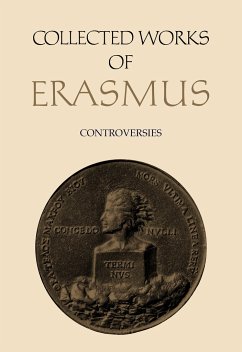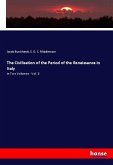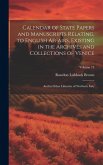- Gebundenes Buch
- Merkliste
- Auf die Merkliste
- Bewerten Bewerten
- Teilen
- Produkt teilen
- Produkterinnerung
- Produkterinnerung
Volume 73 of the Collected Works invites the reader to examine Erasmus’ own explanations of his philological method and its theological significance.
Andere Kunden interessierten sich auch für
![Renaissance in Italy: The age of the despots Renaissance in Italy: The age of the despots]() John Addington SymondsRenaissance in Italy: The age of the despots40,90 €
John Addington SymondsRenaissance in Italy: The age of the despots40,90 €![A New Imperial History of Northern Eurasia, 600-1700: From Russian to Global History A New Imperial History of Northern Eurasia, 600-1700: From Russian to Global History]() Marina B. MogilnerA New Imperial History of Northern Eurasia, 600-1700: From Russian to Global History129,99 €
Marina B. MogilnerA New Imperial History of Northern Eurasia, 600-1700: From Russian to Global History129,99 €![Tudors: The Illustrated History Tudors: The Illustrated History]() Richard RexTudors: The Illustrated History37,99 €
Richard RexTudors: The Illustrated History37,99 €![The Civilisation of the Period of the Renaissance in Italy The Civilisation of the Period of the Renaissance in Italy]() Jacob BurckhardtThe Civilisation of the Period of the Renaissance in Italy31,90 €
Jacob BurckhardtThe Civilisation of the Period of the Renaissance in Italy31,90 €![Calendar of State Papers and Manuscripts Relating, to English Affairs, Existing in the Archives and Collections of Venice: And in Other Libraries of N Calendar of State Papers and Manuscripts Relating, to English Affairs, Existing in the Archives and Collections of Venice: And in Other Libraries of N]() Rawdon Lubbock BrownCalendar of State Papers and Manuscripts Relating, to English Affairs, Existing in the Archives and Collections of Venice: And in Other Libraries of N50,99 €
Rawdon Lubbock BrownCalendar of State Papers and Manuscripts Relating, to English Affairs, Existing in the Archives and Collections of Venice: And in Other Libraries of N50,99 €![History of the Latin and Teutonic Nations from 1494 to 1514 History of the Latin and Teutonic Nations from 1494 to 1514]() Leopold von RankeHistory of the Latin and Teutonic Nations from 1494 to 151430,90 €
Leopold von RankeHistory of the Latin and Teutonic Nations from 1494 to 151430,90 €![Cardinal Allen's Defence of Sir William Stanley's Surrender of Deventer, January 29, 1586-7 Cardinal Allen's Defence of Sir William Stanley's Surrender of Deventer, January 29, 1586-7]() William AllenCardinal Allen's Defence of Sir William Stanley's Surrender of Deventer, January 29, 1586-735,99 €
William AllenCardinal Allen's Defence of Sir William Stanley's Surrender of Deventer, January 29, 1586-735,99 €-
-
-
Volume 73 of the Collected Works invites the reader to examine Erasmus’ own explanations of his philological method and its theological significance.
Hinweis: Dieser Artikel kann nur an eine deutsche Lieferadresse ausgeliefert werden.
Hinweis: Dieser Artikel kann nur an eine deutsche Lieferadresse ausgeliefert werden.
Produktdetails
- Produktdetails
- Verlag: University of Toronto Press
- Seitenzahl: 344
- Erscheinungstermin: 11. August 2015
- Englisch
- Abmessung: 254mm x 180mm x 28mm
- Gewicht: 816g
- ISBN-13: 9781442648944
- ISBN-10: 1442648945
- Artikelnr.: 42990076
- Herstellerkennzeichnung
- Libri GmbH
- Europaallee 1
- 36244 Bad Hersfeld
- gpsr@libri.de
- Verlag: University of Toronto Press
- Seitenzahl: 344
- Erscheinungstermin: 11. August 2015
- Englisch
- Abmessung: 254mm x 180mm x 28mm
- Gewicht: 816g
- ISBN-13: 9781442648944
- ISBN-10: 1442648945
- Artikelnr.: 42990076
- Herstellerkennzeichnung
- Libri GmbH
- Europaallee 1
- 36244 Bad Hersfeld
- gpsr@libri.de
Desiderius Erasmus (c. 1466-1536), a Dutch humanist, Catholic priest, and scholar, was one of the most influential Renaissance figures. A professor of divinity and Greek, Erasmus wrote, taught, and travelled, meeting with Europe's foremost scholars. A prolific author, Erasmus wrote on both ecclesiastic and general human interest subjects.
Introduction
Translator’s Note
A Defence by Erasmus of Rotterdam Publicly Refuting the Mischievous Clamour
of Certain Men among People both Influential and Humble to Whom They
Declare that it was an Impiety on his Part to Translate in the Gospel of
John: In principio erat sermo (1520a)
Apologia Erasmi Roterodami palam refellens quorundam seditiosos clamores
apud populum ac magnates, quibus ut impie factum iactitant, quod in
evangelio Ioannis verterit, ‘In principio erat sermo’
A Defence by Desiderius Erasmus of Rotterdam of In principio erat sermo
(1520b)
Desiderii Erasmi Roterodami Apologia de ‘In principio erat sermo’
A Defence by Erasmus of Rotterdam against Criticism Made in Public Teaching
by Nicolaas of Egmond of the Passage in Paul’s First Epistle to the
Corinthians, Chapter 15 ‘We shall indeed all rise again, but we shall not
all be changed’
Desiderii Erasmi Roterodami Apologia de loco taxato in publica professione
per Nicolaum Ecmondanum Theologum et Carmelitanum Lovanii. Locus est in
epistola Pauli ad Corinthios priore, cap XV: ‘Omnes quidem resurgemus, sed
non omnes immutabimur
A Letter by Desiderius Erasmus Defending his Views Concerning the
Prohibition on Eating Meat and Similar Human Regulations, to the Reverend
Father in Christ and Honourable Prince Christopher, Bishop of Basel
Ad reverendum in Christo patrem et illustrem principem Christophorum
episcopum Basiliensem, epistola apologetica Erasmi Roterodami, de
interdicto esu carnium, deque similibus hominum constitutionibus
Notes on the Letter about Abstinence
In epistolam de delectu ciborum scholia
A Response by Desiderius Erasmus to the Discussions of a Certain ‘Youth Who
Would Teach his Elders’
Desiderii Erasmi responsio ad Collationes cuiusdam iuvenis gerontodidasca
Works Frequently Cited
Short-Title Forms Erasmus’ Works
Index of Scriptural References
Index of Green and Latin Works Cited
General Index
Translator’s Note
A Defence by Erasmus of Rotterdam Publicly Refuting the Mischievous Clamour
of Certain Men among People both Influential and Humble to Whom They
Declare that it was an Impiety on his Part to Translate in the Gospel of
John: In principio erat sermo (1520a)
Apologia Erasmi Roterodami palam refellens quorundam seditiosos clamores
apud populum ac magnates, quibus ut impie factum iactitant, quod in
evangelio Ioannis verterit, ‘In principio erat sermo’
A Defence by Desiderius Erasmus of Rotterdam of In principio erat sermo
(1520b)
Desiderii Erasmi Roterodami Apologia de ‘In principio erat sermo’
A Defence by Erasmus of Rotterdam against Criticism Made in Public Teaching
by Nicolaas of Egmond of the Passage in Paul’s First Epistle to the
Corinthians, Chapter 15 ‘We shall indeed all rise again, but we shall not
all be changed’
Desiderii Erasmi Roterodami Apologia de loco taxato in publica professione
per Nicolaum Ecmondanum Theologum et Carmelitanum Lovanii. Locus est in
epistola Pauli ad Corinthios priore, cap XV: ‘Omnes quidem resurgemus, sed
non omnes immutabimur
A Letter by Desiderius Erasmus Defending his Views Concerning the
Prohibition on Eating Meat and Similar Human Regulations, to the Reverend
Father in Christ and Honourable Prince Christopher, Bishop of Basel
Ad reverendum in Christo patrem et illustrem principem Christophorum
episcopum Basiliensem, epistola apologetica Erasmi Roterodami, de
interdicto esu carnium, deque similibus hominum constitutionibus
Notes on the Letter about Abstinence
In epistolam de delectu ciborum scholia
A Response by Desiderius Erasmus to the Discussions of a Certain ‘Youth Who
Would Teach his Elders’
Desiderii Erasmi responsio ad Collationes cuiusdam iuvenis gerontodidasca
Works Frequently Cited
Short-Title Forms Erasmus’ Works
Index of Scriptural References
Index of Green and Latin Works Cited
General Index
Introduction
Translator’s Note
A Defence by Erasmus of Rotterdam Publicly Refuting the Mischievous Clamour
of Certain Men among People both Influential and Humble to Whom They
Declare that it was an Impiety on his Part to Translate in the Gospel of
John: In principio erat sermo (1520a)
Apologia Erasmi Roterodami palam refellens quorundam seditiosos clamores
apud populum ac magnates, quibus ut impie factum iactitant, quod in
evangelio Ioannis verterit, ‘In principio erat sermo’
A Defence by Desiderius Erasmus of Rotterdam of In principio erat sermo
(1520b)
Desiderii Erasmi Roterodami Apologia de ‘In principio erat sermo’
A Defence by Erasmus of Rotterdam against Criticism Made in Public Teaching
by Nicolaas of Egmond of the Passage in Paul’s First Epistle to the
Corinthians, Chapter 15 ‘We shall indeed all rise again, but we shall not
all be changed’
Desiderii Erasmi Roterodami Apologia de loco taxato in publica professione
per Nicolaum Ecmondanum Theologum et Carmelitanum Lovanii. Locus est in
epistola Pauli ad Corinthios priore, cap XV: ‘Omnes quidem resurgemus, sed
non omnes immutabimur
A Letter by Desiderius Erasmus Defending his Views Concerning the
Prohibition on Eating Meat and Similar Human Regulations, to the Reverend
Father in Christ and Honourable Prince Christopher, Bishop of Basel
Ad reverendum in Christo patrem et illustrem principem Christophorum
episcopum Basiliensem, epistola apologetica Erasmi Roterodami, de
interdicto esu carnium, deque similibus hominum constitutionibus
Notes on the Letter about Abstinence
In epistolam de delectu ciborum scholia
A Response by Desiderius Erasmus to the Discussions of a Certain ‘Youth Who
Would Teach his Elders’
Desiderii Erasmi responsio ad Collationes cuiusdam iuvenis gerontodidasca
Works Frequently Cited
Short-Title Forms Erasmus’ Works
Index of Scriptural References
Index of Green and Latin Works Cited
General Index
Translator’s Note
A Defence by Erasmus of Rotterdam Publicly Refuting the Mischievous Clamour
of Certain Men among People both Influential and Humble to Whom They
Declare that it was an Impiety on his Part to Translate in the Gospel of
John: In principio erat sermo (1520a)
Apologia Erasmi Roterodami palam refellens quorundam seditiosos clamores
apud populum ac magnates, quibus ut impie factum iactitant, quod in
evangelio Ioannis verterit, ‘In principio erat sermo’
A Defence by Desiderius Erasmus of Rotterdam of In principio erat sermo
(1520b)
Desiderii Erasmi Roterodami Apologia de ‘In principio erat sermo’
A Defence by Erasmus of Rotterdam against Criticism Made in Public Teaching
by Nicolaas of Egmond of the Passage in Paul’s First Epistle to the
Corinthians, Chapter 15 ‘We shall indeed all rise again, but we shall not
all be changed’
Desiderii Erasmi Roterodami Apologia de loco taxato in publica professione
per Nicolaum Ecmondanum Theologum et Carmelitanum Lovanii. Locus est in
epistola Pauli ad Corinthios priore, cap XV: ‘Omnes quidem resurgemus, sed
non omnes immutabimur
A Letter by Desiderius Erasmus Defending his Views Concerning the
Prohibition on Eating Meat and Similar Human Regulations, to the Reverend
Father in Christ and Honourable Prince Christopher, Bishop of Basel
Ad reverendum in Christo patrem et illustrem principem Christophorum
episcopum Basiliensem, epistola apologetica Erasmi Roterodami, de
interdicto esu carnium, deque similibus hominum constitutionibus
Notes on the Letter about Abstinence
In epistolam de delectu ciborum scholia
A Response by Desiderius Erasmus to the Discussions of a Certain ‘Youth Who
Would Teach his Elders’
Desiderii Erasmi responsio ad Collationes cuiusdam iuvenis gerontodidasca
Works Frequently Cited
Short-Title Forms Erasmus’ Works
Index of Scriptural References
Index of Green and Latin Works Cited
General Index








